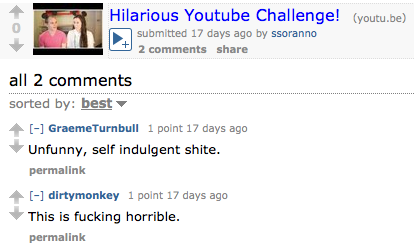While the World Wide Web can be a glorious thing, it also has quite the dark side. One aspect of this is the effect of anonymity, and how it drives people to act in ways that they would (should) not in real life. Particularly with regard to comments on sites such as YouTube, Reddit, etc. where an individual can comment under a username that does not represent their true identity. For example, in the following image, you can see 2 comments posted on a video I uploaded to Reddit – and how vicious people can get over the most innocent of things (internet bullies feed off of innocence). In the case of the 2nd commenter, their username renders them completely anonymous because it doesn’t portray an actual name. In the case of the 1st commenter, they could be writing under a pseudonym. Instead of a boy named Graeme, it could really be a Nick, or Susan, or Bob.

This is not to say that the websites themselves are not partially to blame. Providing options to “dislike” or “down-vote” another person’s post provides an easy way for people to spread hate, whilst remaining completely anonymous. A famous example of hate spread in this way can be found on the YouTube video of Rebecca Black’s song “Friday”. While I myself am not a fan of the song, and understand why that is the majority’s opinion, the hate that Black suffered over the song was tremendous. Of the people who clicked the “like” or “dislike” buttons, 80% decided to dislike – amounting to over 1 million people. And that doesn’t take into account the sheer amount of negative comments she received, both on and off of YouTube. I am definitely of the opinion that options such as “dislike” and “down-vote” buttons should be removed from sites, as I don’t believe they serve any purpose other than to express hate.

Anonymity, however, is not something that can be “fixed” about the Internet. Nor do I believe that there is a realistic way of monitoring the Internet for these negative commentors and reporting or banning them from sites – they will simply create another account. I do believe, though, that there should be more awareness of this issue. Parents should be aware of what their children can and will encounter on the Web, despite how safely they browse. Children and adolescents (heck, even adults) should be prepared for the fact that there are people out there who will write nasty things about them, irrespective of the material they are commenting on. Schools should talk not only about bullying in the halls, but bullying on Facebook and YouTube. And there should be fewer opportunities for Internet bullies to spread their hate, such as with the removal of “dislike” buttons. These things won’t solve the problem, but even if they can help one child or stop one bully, they are worth it. Too many individuals suffer from the actions of Internet bullies, and it’s time the issue was properly addressed.